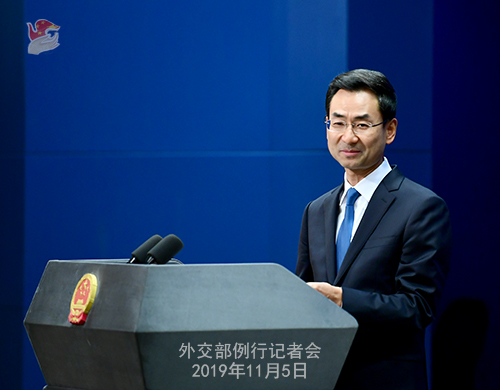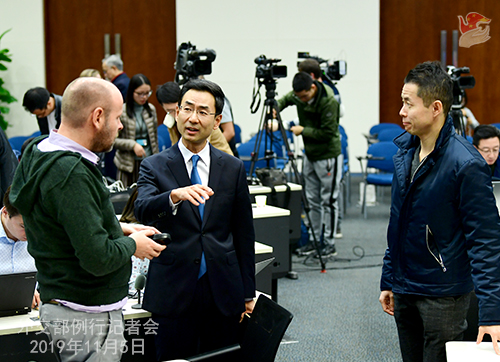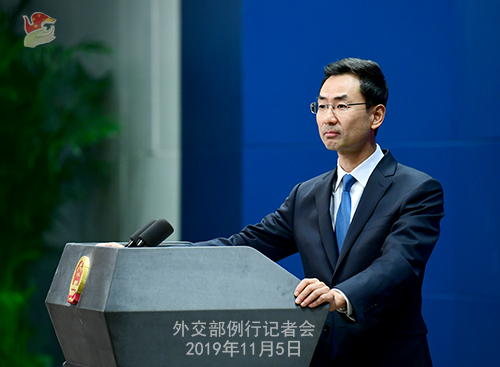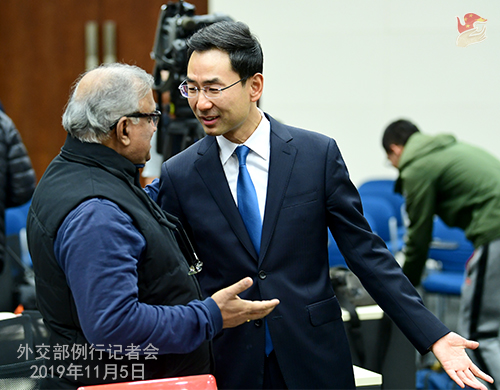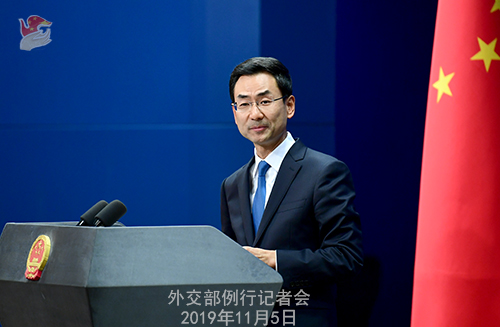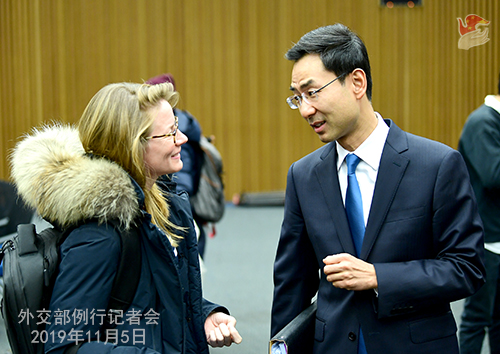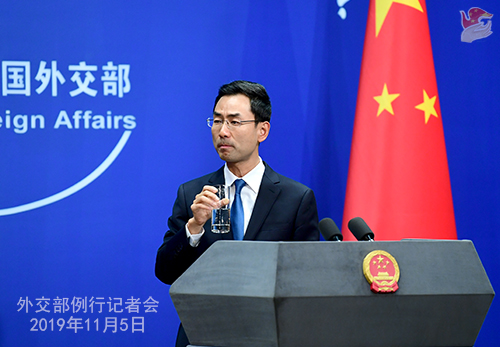| Foreign Ministry Spokesperson Geng Shuang's Regular Press Conference on November 5, 2019 |
| 2019-11-05 21:32 |
|
Q: The United States on Monday imposed sanctions on nine people close to General Staff of Iran's Armed Forces and the supreme leader Ayatollah Ali Khamenei, including one of his sons. I wonder if China has any comment? A:China opposes unilateral sanctions and so-called "long-arm jurisdiction". Arbitrary sanctions or threat of sanction cannot solve problems. The key is dialogue and negotiation. Following the principle of equality and mutual respect, we hope relevant parties will resolve disputes through dialogue and consultation and jointly uphold peace and stability of the region and beyond. Q: Similar questions to the one I asked yesterday on China-US trade talks. Do you have any updates yet, as to when and where the two leaders might meet? Do you have any update on the current state of negotiations towards the phase one trade deal? What requirements or requests China is making to the United States at the moment in these discussions? A: I'll leave that to the Ministry of Commerce. What I can tell you is that China and the US stay in contact. The trade talks have achieved progress and are now moving forward as planned. I have nothing to update you regarding the meeting between two presidents. As I said, they stay in contact through various means. Q: On November 4, White House National Security Adviser Robert O'Brien at the US-ASEAN Summit took a swipe at China, saying Beijing was using intimidation to try to stop ASEAN nations from exploiting their offshore resources. "That's just not how things should be done in the 21st Century. That's conquest. Big countries should not bully other countries. We don't think we're meddlers. We always come when we're invited." I wonder if you have any comment on his remarks? A: The words of the US official sounded assertive but were in fact aimed to shift blames. His remarks were more of a confession of the country's own behaviors in the South China Sea. With the joint efforts made by China and ASEAN countries, the situation in the South China Sea remains generally stable. We have good communication and cooperation on this issue, and we have every readiness, capability and confidence to safeguard peace and stability while working for improvement in the situation in the South China Sea. We advise the US to respect and support regional countries' efforts, and not to stir up troubles, destabilize the region or undermine East Asian cooperation.
Q: Russian prime minister announced that it welcomed China's imitative to hold the next round of intra-Afghan talks in Beijing with participation of all sides, including the Afghan government, other Afghan leaders and Taliban. Can you give us any details of the next meeting? A: China firmly supports the "Afghan-led, Afghan-owned", broad and inclusive process of peace and reconciliation. We support the intra-Afghan dialogue between the Afghan government, the Afghan Taliban and other parties. We are ready to provide convenience and assistance for Afghanistan's peace and reconciliation process based on our respect for the will of all relevant Afghan parties. The information you asked about, once available, will be released in due course. Q: According to the French president's office, on Wednesday during President Macron's visit to China, the two sides will sign an agreement, which includes a paragraph on the irreversibility of the Paris Agreement. Can you confirm that? And what's your comment regarding the signing of this text when the US started its process of withdrawing from the Paris Agreement? A: I guess you are more interested in our view on US withdrawal from the Paris Agreement. China regrets that the US began the process to withdraw from the Paris Agreement. Climate change is a challenge to all human beings. All countries need to work together with their best efforts. The United Nations Climate Action Summit last September stressed the importance of multilateralism, necessity of cooperation and support for fully implementing the Paris Agreement. Now there are 187 parties to the Paris Agreement after Russia joined it not long ago. On multilateral cooperation, we hope the US will act proactively and responsibly instead of pulling out. As the biggest developing country, China firmly supports multilateralism. We support the Paris Agreement, actively fulfill our international obligations that are consistent with our development stage and national condition, and take policy actions on climate change. We will continue to work towards this end, participate in multilateral process and uphold global governance in this area. We will also keep close communication and coordination with other countries. You asked about President Macron's visit to China. As I know, he and Chinese leaders will exchange views on climate change. We will keep you updated on any specific agreement between the two sides. I'd like to reaffirm China's commitment to working with all countries for full and effective implementation of the Paris Agreement and for green, low-carbon and sustainable development of the world.
Q: US President Trump said that China and Russia both would like to reach an arms control deal with the US. He added that the US is dealing with China and Russia, "I think they would both like to do it especially as we are talking about nuclear weapons." What's your comment? A: Regarding the trilateral arms control negotiation that involves China and Russia as the US claims, we stated our position on many previous occasions. China's attitude is very clear. The premise and basis for a trilateral arms control negotiation doesn't exist at all and China won't be part of that. Like we said, the US has been trying to drag China in when it comes to this issue. We wonder whether the US wants to have China's nuclear arsenal increased to its level or reduce its own nuclear arms to China's level? As the possessor of the largest and most advanced nuclear arsenal in the world, the US should earnestly fulfill its special responsibility for nuclear disarmament, respond to Russia's call to extend the new Strategic Arms Reduction Treaty (New START), further reduce its large nuclear arsenal and create conditions for other nuclear states to join multilateral nuclear disarmament negotiations. Q: According to BBC reports, China rent a large amount of land in Russia's Far East Region, which is complained by locals as an "expansion". I wonder if you have any comment? A: So-called "China expansion" in Russia's Far East Region has long been proven fake news. It is irresponsible for certain media to use old and baseless materials to question and smear China-Russia cooperation. This year marks the 70th anniversary of the establishment of diplomatic ties between China and Russia. Our practical cooperation has yielded remarkable outcomes especially in the Far East Region. China has been the biggest trading partner of the Far East Region for many consecutive years. We are also its biggest source of FDI as we participate in the region's leap-foward development zone and free port projects. Agriculture is another key area for cooperation there. China and Russia signed a development plan on cooperation in soybeans and the Development Plan for Agriculture in Northeast China and the Russian Far East and Baikal Regions, covering trade in agricultural products, processing, warehousing and logistics. Agricultural cooperation plays an important role in our economic growth, social development and people's welfare. Pursuing the principle of mutual benefit, China will continue to work with Russia for deeper practical cooperation and more tangible benefits. Q: Le Monde published an article regarding suspected money laundering of a Chinese bank in France while French President Macron is still visiting China. Do you have any comment? A: We noted the report. The Chinese government asks Chinese companies to operate according to law and regulation. China and France have an agreement on judicial mutual assistance, and our judicial organs maintain good communication and cooperation in this case. As President Macron is still visiting China, I hope certain media will stop dramatizing a normal case of judicial assistance out of ulterior intentions. China and France now enjoy a sound and stable relationship performing at a high level. Taking President Macron's visit as an opportunity, China is ready to elevate our exchange and cooperation to a higher level.
Q: Ali Akbar Salehi, head of the Atomic Energy Organization of Iran, said on November 4 that Iran launched the cascade of 30 IR-6 centrifuges, and the country is now operating 60 IR-6 advanced centrifuges. In the meantime, Iranian scientists are working on a prototype called the IR-9. On the same day, EU and German officials called on Iran to exercise restraint and observe the JCPOA. I wonder if you have any comment? A: I noted relevant reports. As we repeatedly pointed out, the root cause of sustained tensions around the Iranian nuclear issue lies with the US unilateral withdrawal from the JCPOA and its maximum pressure campaign against Iran. As the Chinese saying goes, "to undo a knot, no one is more suited than the person who tied it." To relieve the current crisis, the US needs to abandon the wrong strategies such as unilateral sanctions and maximum pressure. In the meantime, Iran and all other parties to the JCPOA need to exercise restraint, implement the deal effectively and in full, and stick to the JCPOA framework to resolve disputes. We urge the relevant sides to move toward the same direction, make greater diplomatic efforts and work for de-escalation. China will continue to work with other parties towards this end. Q: I have questions related to China-US trade. Media reports say the US and Chinese officials are actively considering rolling back some tariffs as part of the phase one trade deal that's under discussions. Would China roll back some tariffs if the US did? A: I'd still refer you to the Ministry of Commerce regarding the China-US trade talks. Here's my principled response. Slapping additional tariffs is not the right way to deal with trade issues, and escalated trade frictions will serve no one's interest. Currently our talks have achieved progress and are moving forward. We hope the two sides will move toward the same direction and work out a solution based on mutual respect, equality and mutual benefit.
Q: I was wondering if MFA could comment on India's decision to not join the RCEP due to concerns about cheap products from China potentially harming domestic industries? A: The RCEP is a regional FTA featuring mutual benefits in nature. Once signed and put in place, the RCEP will help Chinese goods go to the Indian and other participating countries' markets. In the same vein, it will also help Indian goods to enter China's and other participating countries' markets. This is a two-way and complementary arrangement. As emerging markets and major developing countries, if put together, China and India boast a huge market of 2.7 billion people with tremendous potential in trade. China doesn't pursue trade surplus against India. Over the past five years, China's imports from India increased by 15%. The two sides should explore more ways and comprehensive measures to step up cooperation in investment, production capacity and tourism, making the pie even bigger and fostering balanced and sustainable trade relations. I want to stress that the RCEP is an open initiative. China will continue to work with all parties to resolve the outstanding issues for India through negotiations in the spirit of mutual understanding and accommodation. We welcome the joining of India at an early date. Q: There were reports that the Chinese leader is open to going to the US for signing a phase one trade deal. What does Beijing think of that? Does China have any preferences on the signing location? Has Beijing also proposed that President Trump come to China? A: This question was raised several times these two days. My answer remains the same. Regarding the meeting between the two presidents, I'd like to say that President Xi and President Trump stay in contact through various means. Q: Hong Kong Chief Executive Carrie Lam is expected to come to Beijing tomorrow. Do you have more details on whom she's going to meet and the aim of her visit? A: This is not a diplomatic matter. If you follow the information released by the Hong Kong SAR government, you would have an idea about the agenda of Chief Executive Carrie Lam's visit. The Hong Kong SAR government already released the relevant information. You might be interested in that.
Q: You said it's 2.7 billion people that China and India put together. Considering India's not taking part in the RCEP agreement, do you think this decision will dent the importance of the deal that has been signed by the 15 countries? A: The third RCEP summit was held in Bangkok yesterday, after which a joint statement was released. It noted that the 15 participating countries have concluded text-based negotiations for all 20 chapters and essentially all their market access issues, and tasked legal scrubbing by them to commence for signing in 2020. The international community pays extensive attention to this important progress. It is generally believed that the conclusion of RCEP negotiations sent out a positive message for building an open world economy and supporting free trade. It will also advance trade and investment liberalization and facilitation in this region, boost greater potential and deliver more benefits to local people. Like I said, China stands ready to join all parties to resolve the outstanding issues for India through further negotiations in the spirit of mutual understanding and accommodation. We welcome the joining of India at an early date. Q: A question related to the CIIE. The European Chamber of Commerce released a survey with its members yesterday, which said that the CIIE put too much emphasis on "quick, headline results instead of creating an environment for European companies to expand in China in the long term". I was wondering what's your response to this? A: I haven't read this survey report you mentioned. Here I'd like to tell you what I noted. First, I noticed President Macron's remarks at the CIIE opening ceremony today. He warmly applauded China for holding this event and said the European side hopes to use this opportunity to deepen cooperation across the board, especially in trade. Second, I noticed the statement released by the EU Commission in Beijing several days ago. The EU highly commended the business opportunities for European companies provided by China through the CIIE, which demonstrated China's sincerity. Judging from those messages, I can see the EU side appreciates the CIIE. It is even more evident if you look at the active participation and high enthusiasm of the European countries and businesses in the CIIE.
|
 |
|
